

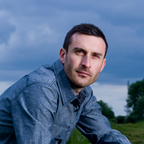


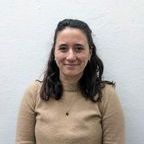




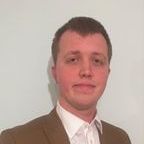
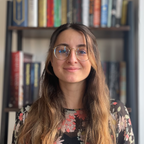
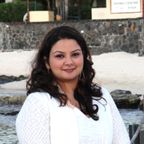
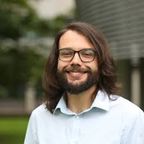

















Campaign for Science and Engineering
Ben joined CaSE in August 2021 and oversees the day-to-day operations of the Discovery Decade project. The project aims to attract a new, broader base of public supporters who can help make R&D investment a political priority. He’s previously held roles at the Wellcome Trust, Academy of Medical Sciences and the Medical Research Council, having completed a PhD at Imperial College London in virology

Imperial College London
Ana has a PhD in Biochemistry from University College Cork and an MEd in ULT from Imperial College London. Ana’s career has not followed the traditional academic route and she currently splits her time between research and teaching in cancer biology and immunology, pedagogical research and development around authentic learning, agency and inclusivity, and College management. Ana joined Imperial College London as a Lecturer in 2005, became Head of Undergraduate Programme Development for the Faculty of Medicine in 2015, which saw her spearhead the development of BSc Medical Biosciences, was its Head of Programme for its first 3 years and became Director of the
Centre for Languages, Culture and Communication in 2020 where she is responsible for >8000 students and most of Imperial’s co-curricular portfolio. More recently, she was appointed as co-Chair of the Strategic Education Committee of the Department of Surgery and Cancer. Member of the Senate and the Learning and Student Experience Committee, she is also part of the senior Learning and Teaching Strategy team at Imperial.

Imperial College London
Dr Simon Foster is a Space scientist and Outreach specialist based at Imperial. Dr Foster holds a PhD in Solar-terrestrial Physics, a Masters degree in Physics with Space Science and PGCE in Science education and has over 20 years’ experience in the fields of Space Science, STEM education and public engagement. He is currently the Head of Outreach for the Faculty of Natural Sciences and Board Member and Engagement Lead for the Imperial Space Lab, a multidisciplinary network of excellence at Imperial College London, that brings together scientists working on a broad range of space related topics, from space medicine to astrophysics.

Imperial College London
Sam is an Orthopaedic Surgeon-Educator and full time PhD student with the Performing Science project at the Centre for Performance Science (ICL/RCM). She trained at Imperial College (MBBS/BSc) and completed her Higher Surgical Training in London in 2016 (FRCS Tr. & Orth, 2015), winning the Pulvertaft Prize of the British Society for Surgery of the Hand in 2017. Sam is a module lead and M Ed dissertation supervisor for the three modules of the Imperial College M Ed Surgical Education and the PG Cert Clinical Education. Sam was previously the Deputy Academic Lead, Collaborative Partnerships Office at the Faculty of Medicine, focusing on medical curriculum design and mapping using the Sofia curriculum mapping software, developed initially for Imperial College School of Medicine and now in use in medical schools and universities across Europe and Australia.
The Ideas Fund
Lewis is passionate about knowledge and cultural democracy - how we can recognise, value and support everyone’s creativity and expertise to enable local action, knowledge production and social justice.
He works at the intersections - across disciplines and levels - from grassroots community action to changing systems including how funding and research partnerships can be made much more equitable and distribute more funding to underrepresented, marginalised groups.
He is the founder and director of Science Ceilidh, an intermediary social enterprise working across Scotland supporting programmes as practitioners, conveners and supporting participatory funding across the Highlands and Islands. As a consultant and speaker he has worked both nationally and internationally including India, UAE and the US, and he currently helps coordinate the global Diversci Community of Practice supporting equitable informal science learning.
Lewis was recently appointed an Engage Fellow with the National Coordinating Centre for Public Engagement and will be focusing on how systems around research be reimagined and changed to enable more equitable power dynamics and inclusive knowledge production with communities.
He is also a Fellow of the Young Academy of Scotland, undertook a UK Creative Community Fellowship with NAS and Derby Museums and now working as faculty on the programme, on the EDI Advisory Group for Creative Scotland, and awarded the Beetlestone Award for Leadership and Legacy in the Science Engagement Field in 2023.
Lewis’ explores his creativity through Scottish traditional music and dance - including playing the fiddle - and more recently training in urban dance styles.

Sense about Science
Annie is the Senior Communities Officer at Sense about Science, and leads on involving as many people and community groups as possible in its work, from all over the UK. She focuses on making sure their goal of ‘public led, expert fed’ is embedded across all their work. This includes facilitating co-creation of materials with stakeholders through our Public Engagement partnerships with researchers, and the public-facing elements of our major campaigns, including Ask for Evidence, Evidence Hunters, and Evidence Week, and other projects, such as Responsible Handover. She is also part of the team delivering the Voice of Young Science workshop programme, that encourages early career researchers to take charge of the public debate around their research.
Annie joined Sense about Science in September 2022, after finishing her PhD in the metabolism of pancreatic cancer at the University of Cambridge.

Imperial College London
Abstract: Higher education research plays a pivotal role in advancing knowledge, driving innovation, and informing policy. Research impact occurs within and between disciplines, across institutions, into the local community and out into the wider world. However, it is not the same as doing research—promoting and sharing research requires translating academic language to reach a broad audience. Engaging research tells a story, bringing the passion from the library, the lab, the field to the everyday.
At Imperial, one way we do this through linking our research and education. This supports developing students, emerging scholars and rising researchers. Education provides a vehicle for structuring and communicating research across all levels. This ranges from discovery-based education inside and outside of the classroom, to promoting innovation and enterprise applications. This talk explores how lessons from the research-education nexus can be applied to broader research impact in the community.
At the core of impact is developing partnerships with researchers, students and the wider community to enrich meaningful engagement. At Imperial, the Student Shapers scheme for staff-student partnerships supports education and student experience enhancement projects. We have Undergraduate Research Opportunity Projects for students to engage directly with academic research. Regular hackathons and enterprise competitions focus directly on outputs from research.
Research impact is all about creating an ecosystem that supports and drives research and researchers, connecting students and communities. This talk explores how we support this at Imperial, and offers lessons for research impact within, across and beyond higher education institutions.
Bio: Dr Camille Kandiko Howson is Professor of Higher Education in the Centre for Higher Education Research and Scholarship (CHERS) at Imperial College London. She is an international expert in higher education research with a focus on student engagement; student outcomes and learning gain; equality and social justice; and quality, performance and accountability. She works to support high quality and high impact pedagogical research and collaborate with colleagues to conduct disciplinary-based educational research. She is the academic lead on developing learning analytics across Imperial, including technological build of a Unified Data Platform and associated College-wide learning analytics governance, policy, ethical guidelines and training. She leads on the design of institutional measures of educational gain, capturing engagement, progression and well-being measures. She is a Council Member of the Society for Research into Higher Education (SRHE) and Chair of the SRHE Research and Development Committee, which she has served on since 2012. Camille has an extensive record of securing external funding from numerous sources, including UKRI; HEFCE; OfS; AdvanceHE; the Quality Assurance Agency (QAA); SRHE; RAND Europe; and the British Council. She has held previous academic positions at King’s College London. She is passionate about making higher education more equitable and fair, supporting women and those underrepresented to access, succeed and work in academia. She is a Principal Fellow of the Higher Education Academy.

Imperial College London
Chotiwat Jantarakasem (CJ) is a PhD student at Imperial. His research focuses on developing a smartphone application for water quality (WQ) tests and applying it to a participation programme. He aims to not only enhance public awareness about the importance of water quality but also empower them to demand better water quality from their suppliers. In 2023, he was honoured with The Anglo-Thai Society Academic Excellence Award.
He holds a BEng and MEng with honours from KMUTT and the UTokyo. He received the KMUTT leadership scholarship, a sufficiency economy philosophy (SEP) scholarship from The Crown Property Bureau and the JICA Innovative Asia scholarship. As the president of the SEP3 scholarship recipient's association, he organised voluntary projects to support people in low-resource settings. He is eager to promote the integration of public engagement in water research and firmly believes in the significance of involving the public in the scientific process.

Imperial College London
Martyn is Professor of Higher Education and Director of the Centre for Higher Education Research and Scholarship at Imperial College London. He is an educational developer and experienced teacher from a biomedical research background and has senior leadership access and influences educational strategy at the institutional level.
Imperial College London
Luke McCrone is a Research Associate in the Centre for Higher Education Research and Scholarship, primarily interested in the nexus between learning spaces, student learning behaviour and institutional strategy. His desire to improve the student experience began representing over 20,000 students at Imperial College London during a transformative sabbatical as Deputy President of Education. He has since partnered with students and staff across diverse STEM departments, leveraging his research insights to inform the redesign of formal, transitional and informal learning spaces. Luke has used novel mixed methods to evaluate these spaces and is continually interested in how an ecological way of thinking can inform their (re)design for more student-centred active learning. His most recent research has explored factors impacting student sense of belonging, including as part of Imperial's five-year longitudinal Belonging, Engagement and Community (BEC) project.

Imperial College London
Jordon is a PhD researcher at Imperial College London, researching how interactions influence life science students' professional identity and career trajectory. He started his career in agriculture following his readings of Animal Behaviour and Welfare at Harper Adams University, where he became a British Poultry scholar. Working within the livestock sector, he developed his passion for teaching by wanting to support the sector, which gave him his start. Continuing to ensure that he has ties to the land-based sector, Jordon is an active beekeeper when not researching or teaching. Capitalising on this passion for the land-based sector, he still maintains an active role in teaching by working alongside organisations like the Brilliant Club whilst ensuring that he maintains his focus on his research, which was motivated by the barriers he saw for his college students and now wanting to find solutions to help students in the higher education sector. He continues looking at different ways to develop his research and teaching skills and how he can enhance representation in the science community, something he has been working on as a member of the SEB OED working group and nomination task force.

GSK
Dr. Federica Raguseo is a passionate researcher and science communicator with a robust academic background and a deep commitment to making science accessible to all. After earning a Master's degree from Imperial College London, where she investigated G-quadruplexes—alternative DNA conformations - she completed a PhD at the same institution, focusing on the mechanisms underlying ALS and FTD, two devastating neurodegenerative diseases. Currently, Federica is a postdoctoral researcher at the Francis Crick Institute, working on DNA damage therapeutics as part of the GSK Prosperity Partnership.
Beyond her research, Dr. Raguseo is an avid science communicator, founding the popular Instagram platform "ThatScienceIllustrator," which has collected over 33,000 followers. The platform aims to make complex scientific concepts accessible to the public through engaging illustrations, and to encourage fellow scientists to leverage social media for societal engagement.
Blurb
In today's digital age, effective science communication is vital for bridging the gap between researchers and the broader community. This workshop offers a practical guide to leveraging social media for impactful science outreach. You'll explore why integrating science communication into your career is essential, learn to tailor your content for diverse audiences, and discover how to carve out your unique niche in the sci-comm landscape. Additionally, we'll discuss the pros and cons of building an online presence, including managing online interactions and balancing your personal and professional life. Through real-world examples and actionable strategies, you'll gain the tools needed to make science more accessible and engaging, turning communication into a rewarding part of your professional journey.

Department of Botany Maitreyi College, University of Delhi
No bio provided

University of Nottingham
Born in Brazil, from a very early age I was told I got too easily obsessed with little things. Today, that critique is my biggest selling point. I am a passionate plant biologist with a knack for solving problems. My main current research interest is the elusive propagation of European broadleaved tree species by cuttings. It is a manifold issue that highlights our gaps in understanding the physiology underlying propagation procedures that are used - and have been for centuries - in nurseries and gardens. I am also interested in Science Education, especially in applying the concept of Scientific and Technological Literacy to curricula to increase student engagement with science as a process rather than just as product. I love trivia, crossword puzzles, political satire and radio comedies.

Imperial College London
Dr Michael Weatherburn is Field Leader of Humanities and Social Sciences and Data Science Institute Academic Fellow at Imperial College London, where he teaches history, technology analysis and business ethics. He is also affiliated to the Institute for Security Science and Technology. He has a PhD in the history of science and technology, is Honorary Associate Professor at Hong Kong University and was onetime Byrne-Bussey Marconi Fellow at Oxford University. He is a Senior Fellow of HE Advance, Fellow of the Royal Society of Arts, Associate Fellow of the Royal Historical Society, and committee member of the U.S. Academy of Management history division.
Title
Alumni shapers: evaluating the impact of humanities, social science and languages (HSSL) learning for STEM students.
Abstract
Imperial's 'Class of 2030' strategy highlights the importance of forward thinking - of our current students as future graduates and alumni. Building on this momentum, this project aims to investigate the value that our alumni can bring to our present and future educational provision, particularly in relation to humanities, social science and languages (HSSL). A 2022 Imperial alumni survey revealed four principal reasons that alumni retrospectively recommended undertaking HSSL learning for STEM students: 1. personal interest, 2. career augmentation (e.g. skills, networks), 3. cross-cultural insight, 4. novel directions in career inflection moments. This being the first study of the impact of HSSL education within a STEM context, we seek to develop a foundation on which future, and richer, such research can be built. We also seek to contribute a methodological perspective: in a time of HE consolidation, particularly in HSSL, we aim to reveal challenges of researching within relatively-newly combined packages of HSSL specialisms.
Key words: STEM, humanities, languages, alumni, impact.